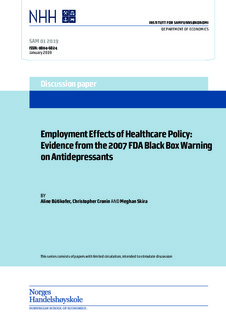Employment Effects of Healthcare Policy: Evidence from the 2007 FDA Black Box Warning on Antidepressants
Working paper

View/
Date
2019-01-04Metadata
Show full item recordCollections
- Discussion papers (SAM) [655]
Abstract
Public policies aimed at improving health may have indirect effects on outcomes such as education and employment. We study the labor market effects of a 2007 regulatory action by the US Food and Drug Administration, in which they expanded the black box warning on antidepressants. Using nationally representative data from the National Survey on Drug Use and Health and a difference-in-differences strategy, we find that employment among women aged 35-49 with a history of depression decreased by 6.1 percent (4.4 percentage points) in response to the warning. We explore potential mechanisms generating these employment effects and find that both antidepressant and psychotherapy use among women aged 35-49 decreased after the warning. Our estimates suggest these same women did not substitute towards non-medical alternatives such as marijuana or alcohol. We find no employment or mental health treatment response among men or among women younger than 35. Overall, our analysis suggests that the 2007 expanded black box warning reduced US labor force participation by 0.23 percentage points and led to roughly $13 billion in lost wages.